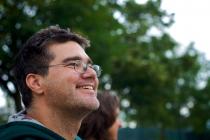Brian Lamb is the Director, Innovation Open Learning at Thompson Rivers University. He shares his experiences working at the intersection of teaching and learning support and student engagement and retention.
 Can you give us a snapshot of Thompson Rivers University’s Centre for Student Engagement and Learning Innovation?
Can you give us a snapshot of Thompson Rivers University’s Centre for Student Engagement and Learning Innovation?
One thing that is unique about TRU’s Centre for Student Engagement and Learning Innovation is suggested by its name. In our Academic Plan, the centre is charged to provide “a coordinated approach to academic and personal student engagement in the social, cultural, creative and intellectual life of the university, through a wide array of program, delivery and service innovations.” We have staff working on student engagement and retention issues working alongside people concerned with teaching and learning support.
As well, we recently brought our Continuing Education division, known as “Community U” into the fold. When you look at the diversity of our expertise, and throw TRU’s Distance and Online Education division into the works, there are opportunities for some interesting collaborations.
We are hard at work on articulating integrated learning outcomes at the course, program, and institution level by the end of 2015. And enhancing and expanding our application of blended learning is another key TRU objective.
What is your role? Can you describe a day-in-the-life of an educational technologist?
I value my role, in part, because of how varied my activities are. I have a dual role with both the centre and with Open Learning. While I serve a number of administrative functions and committees, I also get to work directly with faculty and students. I am engaged with policy decisions on the institutional level, but also get my hands dirty doing practical technology work almost every day. It’s expected I keep up with trends and developments in the field, and maintain a network of peers and collaborators beyond the university, which is great fun.
My most satisfying moments are working directly with students and instructors, whether it’s in courses, workshops, or just talking one-on-one. People are beginning to know who I am, and increasingly I’m seen as a go-to person when someone has a strange interest or question, particularly concerning learning technology.
What are some of the more innovative projects that you’ve worked on?
I was very proud to be associated with last summer’s “Art + Reconciliation” open learning and sharing platform. It brought together both Aboriginal and non-Aboriginal people who collaborated on artwork around the theme of reconciliation. I was pleased we were able to make the site so accessible and participatory.
I have a had a lot of fun working with instructors on getting students to tell digital stories in a variety of courses, such as for the Literature of Utopia. As well, I’ve been working with my former colleagues at UBC to bring the Wiki platform there and begin to apply it at TRU. I’ve also enjoyed working with our media experts here to deliver participatory audio and video storytelling workshops in a variety of settings. They’ve gone over extremely well.
In addition, I’ve been heartened to see significant interest in the BCcampus Open Textbook Project from a number of areas here, and am hopeful we will soon have a number of success stories resulting from those efforts.
What are some of the trends that you’re keeping an eye on – with respect to educational technologies and learning platforms?
This may be reflective of my own stubbornness, but I am still most excited by the most of the same things about the web that I’ve been whooping up for many years now. I think the potential for people to independently or cooperatively produce and share media is still mostly untapped by higher education. The capacity to limitlessly reproduce knowledge resources, to share them instantly to people around the world, to be able to cooperate in real time with distant locales, and to recombine and remix what we do; those basic capacities still interest me most. So I’m feeling self-consciously retro lately, most interested in what Microsoft evangelist Jon Udell calls “trailing edge technologies”, with the tools where users can still exercise the most meaningful forms of control.
Can you share how open educational resources (OER) are changing higher-ed? What is your vision of the future?
I think the full effects of “open” on higher education won’t be known for some time. But for the reasons I outline above, open and digital tools have immense potential to increase access to learning, and to make learning more dynamic, engaging and socially relevant. But those outcomes are hardly automatic. I hope that in the future higher education will come to see that understanding and authoritatively using digital media are critical literacies in their own right, and embed the needed reflection and skill building across the curriculum. This stuff is too far-reaching and important to be limited to media studies courses.
Notable quotes
I think the potential for people to independently or cooperatively produce and share media is still mostly untapped by higher education.
I hope that in the future higher education will come to see that understanding and authoritatively using digital media are critical literacies in their own right, and embed the needed reflection and skill building across the curriculum. This stuff is too far-reaching and important to be limited to media studies courses.
Learn more
- TRU Centre for Student Engagement and Learning Innovation
- TRU Open Learning
- Reclaiming Innovation by Brian Lamb and Jim Groom
- Truth and reconciliation through art
- Brian Lamb’s blog
- Brian on Twitter
